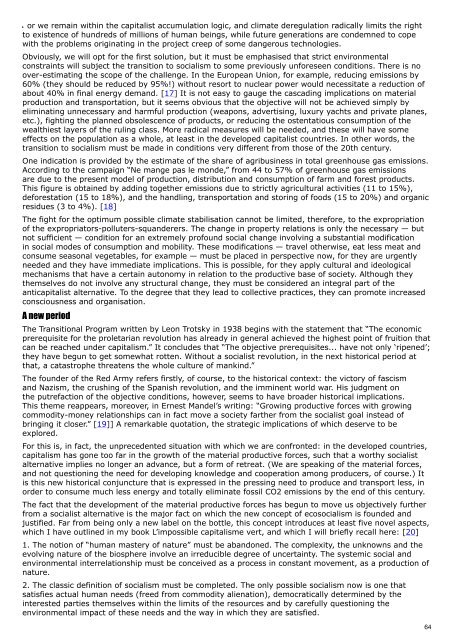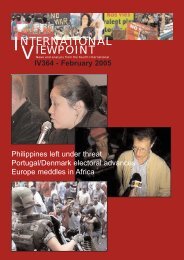here - International Viewpoint
here - International Viewpoint
here - International Viewpoint
You also want an ePaper? Increase the reach of your titles
YUMPU automatically turns print PDFs into web optimized ePapers that Google loves.
or we remain within the capitalist accumulation logic, and climate deregulation radically limits the right<br />
to existence of hundreds of millions of human beings, while future generations are condemned to cope<br />
with the problems originating in the project creep of some dangerous technologies.<br />
Obviously, we will opt for the first solution, but it must be emphasised that strict environmental<br />
constraints will subject the transition to socialism to some previously unforeseen conditions. T<strong>here</strong> is no<br />
over-estimating the scope of the challenge. In the European Union, for example, reducing emissions by<br />
60% (they should be reduced by 95%!) without resort to nuclear power would necessitate a reduction of<br />
about 40% in final energy demand. [17] It is not easy to gauge the cascading implications on material<br />
production and transportation, but it seems obvious that the objective will not be achieved simply by<br />
eliminating unnecessary and harmful production (weapons, advertising, luxury yachts and private planes,<br />
etc.), fighting the planned obsolescence of products, or reducing the ostentatious consumption of the<br />
wealthiest layers of the ruling class. More radical measures will be needed, and these will have some<br />
effects on the population as a whole, at least in the developed capitalist countries. In other words, the<br />
transition to socialism must be made in conditions very different from those of the 20th century.<br />
One indication is provided by the estimate of the share of agribusiness in total greenhouse gas emissions.<br />
According to the campaign “Ne mange pas le monde,” from 44 to 57% of greenhouse gas emissions<br />
are due to the present model of production, distribution and consumption of farm and forest products.<br />
This figure is obtained by adding together emissions due to strictly agricultural activities (11 to 15%),<br />
deforestation (15 to 18%), and the handling, transportation and storing of foods (15 to 20%) and organic<br />
residues (3 to 4%). [18]<br />
The fight for the optimum possible climate stabilisation cannot be limited, t<strong>here</strong>fore, to the expropriation<br />
of the expropriators-polluters-squanderers. The change in property relations is only the necessary — but<br />
not sufficient — condition for an extremely profound social change involving a substantial modification<br />
in social modes of consumption and mobility. These modifications — travel otherwise, eat less meat and<br />
consume seasonal vegetables, for example — must be placed in perspective now, for they are urgently<br />
needed and they have immediate implications. This is possible, for they apply cultural and ideological<br />
mechanisms that have a certain autonomy in relation to the productive base of society. Although they<br />
themselves do not involve any structural change, they must be considered an integral part of the<br />
anticapitalist alternative. To the degree that they lead to collective practices, they can promote increased<br />
consciousness and organisation.<br />
A new period<br />
The Transitional Program written by Leon Trotsky in 1938 begins with the statement that “The economic<br />
prerequisite for the proletarian revolution has already in general achieved the highest point of fruition that<br />
can be reached under capitalism.” It concludes that “The objective prerequisites... have not only ‘ripened’;<br />
they have begun to get somewhat rotten. Without a socialist revolution, in the next historical period at<br />
that, a catastrophe threatens the whole culture of mankind.”<br />
The founder of the Red Army refers firstly, of course, to the historical context: the victory of fascism<br />
and Nazism, the crushing of the Spanish revolution, and the imminent world war. His judgment on<br />
the putrefaction of the objective conditions, however, seems to have broader historical implications.<br />
This theme reappears, moreover, in Ernest Mandel’s writing: “Growing productive forces with growing<br />
commodity-money relationships can in fact move a society farther from the socialist goal instead of<br />
bringing it closer.” [19]] A remarkable quotation, the strategic implications of which deserve to be<br />
explored.<br />
For this is, in fact, the unprecedented situation with which we are confronted: in the developed countries,<br />
capitalism has gone too far in the growth of the material productive forces, such that a worthy socialist<br />
alternative implies no longer an advance, but a form of retreat. (We are speaking of the material forces,<br />
and not questioning the need for developing knowledge and cooperation among producers, of course.) It<br />
is this new historical conjuncture that is expressed in the pressing need to produce and transport less, in<br />
order to consume much less energy and totally eliminate fossil CO2 emissions by the end of this century.<br />
The fact that the development of the material productive forces has begun to move us objectively further<br />
from a socialist alternative is the major fact on which the new concept of ecosocialism is founded and<br />
justified. Far from being only a new label on the bottle, this concept introduces at least five novel aspects,<br />
which I have outlined in my book L’impossible capitalisme vert, and which I will briefly recall <strong>here</strong>: [20]<br />
1. The notion of “human mastery of nature” must be abandoned. The complexity, the unknowns and the<br />
evolving nature of the biosp<strong>here</strong> involve an irreducible degree of uncertainty. The systemic social and<br />
environmental interrelationship must be conceived as a process in constant movement, as a production of<br />
nature.<br />
2. The classic definition of socialism must be completed. The only possible socialism now is one that<br />
satisfies actual human needs (freed from commodity alienation), democratically determined by the<br />
interested parties themselves within the limits of the resources and by carefully questioning the<br />
environmental impact of these needs and the way in which they are satisfied.<br />
64









